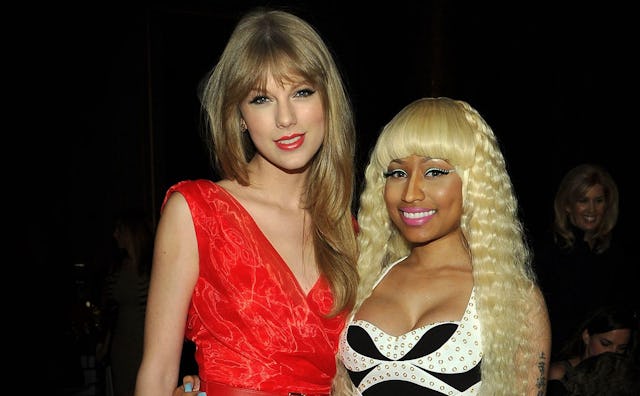Why We Need To Stop Taking Our Girl Fights To Twitter

Everyone has disagreements. Even girlfriends!
Especially girlfriends.
I encourage young women to feel comfortable disagreeing with their friends. It allows them to make their case, express how they feel, get to understand one another better, and learn to work through their differences.
But must they always do it in front of an audience on social media?
If you happen to be living under a rock or dislike celebrity gossip or think Twitter is a type of candy, then you might not have heard about how Nicki Minaj vented on Twitter because she wasn’t 100 percent happy with her MTV VMA nominations, how Taylor Swift took that 140 character (38 of them being smiley emojis) statement personally, or how Katy Perry jumped into the ring as well, dragging Rihanna in with her, whether she wanted to be there or not.
The details of the argument that played out center stage on social media—which ended up including hot topics like race, gender, weight and talent—are serious, but what I want to focus on right now is how, yet again, we have a perfect example to show our kids of why they should not default to having all discussions with their friends in front of an audience.
Because of one comment Nicki made that Taylor assumed was directed at her, which then got Katy all riled up, a cumulative 153.7 million of their friends ended up involved. Plus their enemies. Plus the media.
That’s one big hot mess that will live on the Internet forever.
FOREVER.
One emotional response to one tweet snowballed into something very ugly, very fast. If only Swifty had thought to privately contact the Ninja to ask if the comment was meant for her, there would have been no spark for KP’s fireworks. There wouldn’t be thousands of comments, arguments within the comments, and articles pressuring readers to back some of these women and shun others.
Maybe it was meant to be a personal jab.
Maybe it wasn’t.
Those of us who are not Nicki or Taylor shouldn’t even know that was a possibility. It was never our business to begin with.
There were these really cool things invented in 1876—you can pick them up, dial some numbers, wait for someone to answer, then speak back and forth with them. They are great for activities like immediately discussing topics of interest, hearing one another’s tone, and privately resolving issues with no outside influences to fan flames and no one to put on a show for.
In this completely backwards, social-media-centric world we’ve created, it is easier for people to clickety-clack away their quick opinions and fleeting accusations in the public eye than it is to communicate one-on-one with the person whose response actually matters.
When I was younger and had a disagreement with a friend, I had to have the guts to walk up to her or call her and hash it out in person. Sure, I might have told my other friends about our spat, and she might have vented to hers, but that’s only a handful of actual friends who live in our circles and can grasp the ramifications of not respecting the Girlfriend Code of Keeping Your Trap Shut. None of these people transcribed our conversations for easy reference the next time the two of us butted heads over something. Instead, we better understood each other, learned a lesson, moved on, and tried to forget about it.
And then social media happened.
From the lack of a much-needed sarcasm font to people who simply don’t know how to articulate themselves clearly, social media is a powder keg just waiting to blow up friendships, feelings—even lives. The ease with which we can share TMI in status updates and know that our friends will be pinged when we tag them makes social media the go-to space for communicating.
What people are forgetting is that it’s not a place for communicating well.
Spectators love a good girl fight. They want to see some hair pulling, and so they push buttons to increase the chances of that happening—whether we’re talking about two international celebrities or two girls from the same high school, about a small misunderstanding that requires a simple apology or a major disagreement. Once those buttons are pushed? There is no turning back, and it can escalate into something sad, polarizing, even dangerous.
So please, stop giving the spectators more power in your relationships than the people with whom you are in the relationship—and encourage your kids to do the same. Go ahead and share funny, interesting or helpful stuff on social media, but take the conflict, concern and truly personal interactions to a much more private, safer place as far away from the Web as you can get. The best thing about taking it offline? You’ll have much more than 140 characters to make sure you both end up on the same page.
This article was originally published on